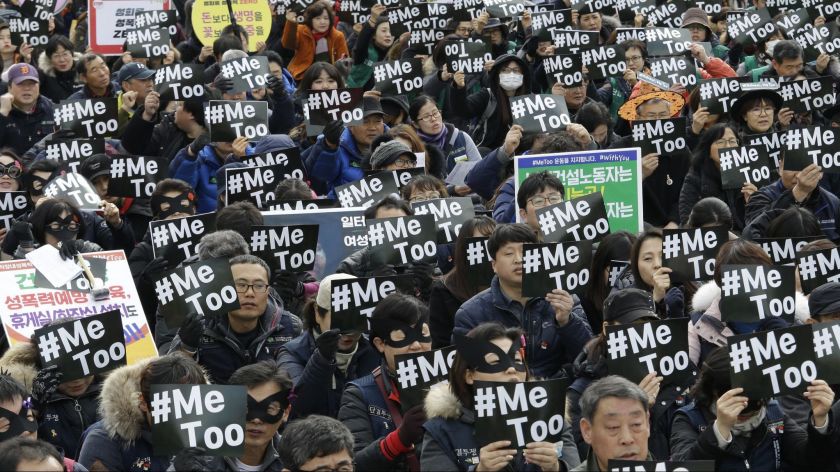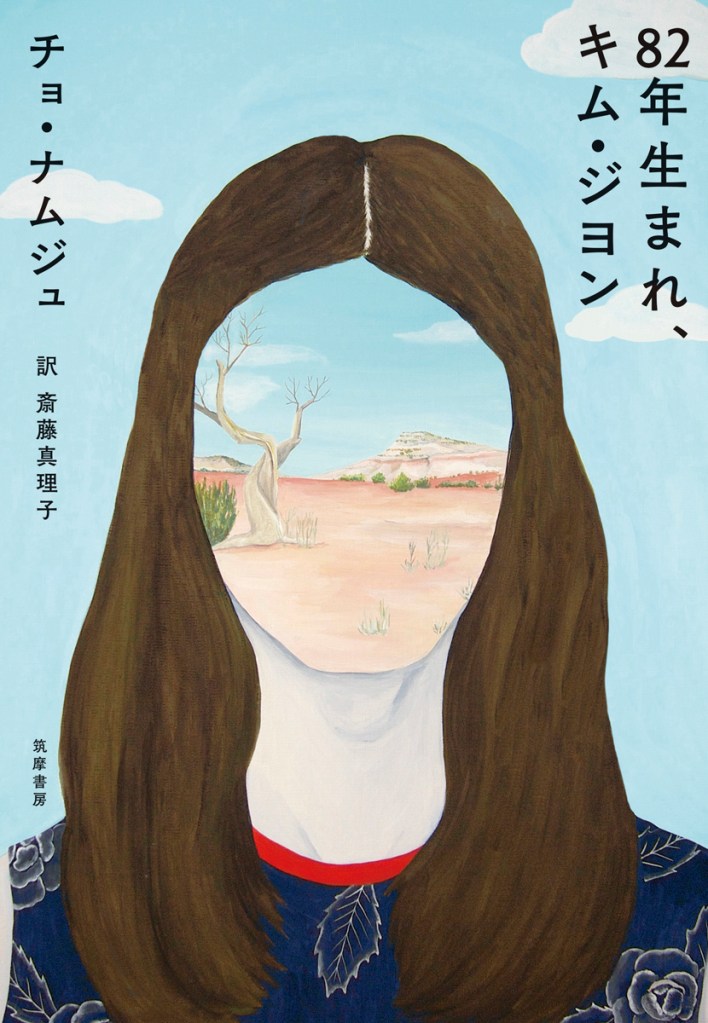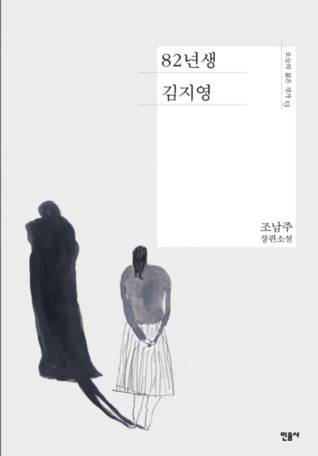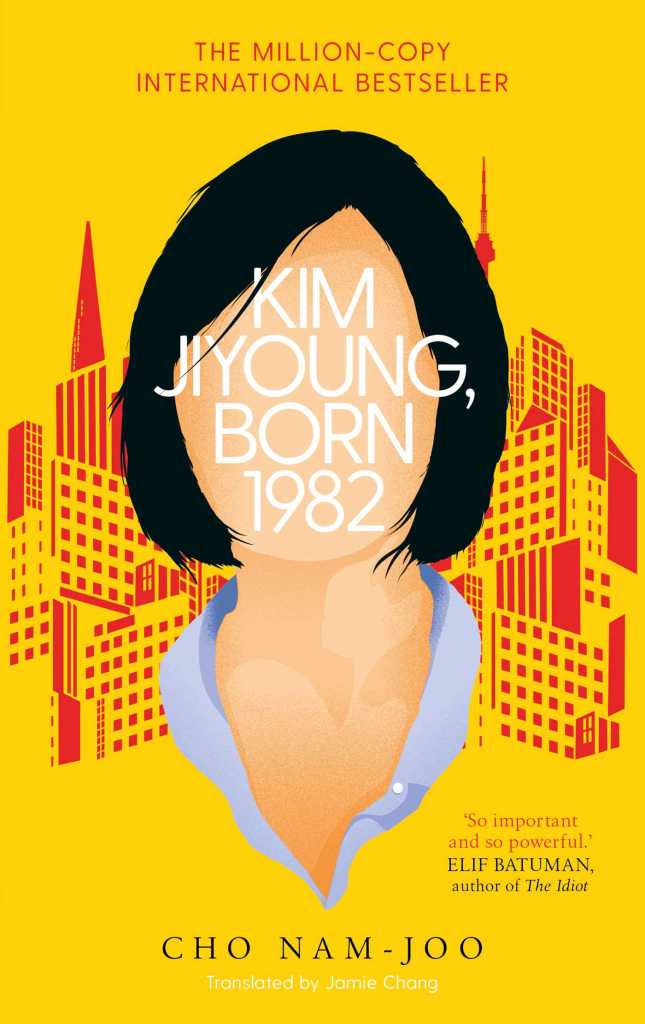Raging feminist thoughts from my purple bedroom (a bit of a book review, a bit of an improperly sourced essay, way too long to be a blog post but here we go anyway).
I am angry. I just finished reading Kim Jiyoung, Born 1982 by Cho Nam-Joo. A novella that reads almost like an exposé, interspersed with statistics like South Korea’s 63% gender pay gap, Cho details the life of a single Korean woman from birth into motherhood. I found myself noting down the countless small moments of sexism Jiyoung experiences, empathizing, then chiding myself for elevating my small struggles. Among the “microaggressions” Cho describes, we see sexual harassment on a bus, teachers lifting girls’s skirts at school, a hidden camera in a women’s bathroom, favoritism of Jiyoung’s younger brother, and an abortion because Jiyoung’s mother can’t bear the embarrassment of having a third daughter instead of a son.

Kim Jiyoung, Born 1982 was published in 2016 in Korea, a couple months after a man stabbed to death a woman in a public restroom. He had never met this woman before. He claimed he committed the murder because he hated women and because he hated being ignored by women. In the wake of this hate crime and the printing of this book emerged the Korean #MeToo movement. Actresses, business execs, and students began to come forward with their stories. But while the movement sent a couple famous men to jail, Korean singers and actresses who voiced their support or even mentioned the book Kim Jiyoung, Born 1982 were “cancelled” on social media, and widespread backlash arose. Feminism is a bad word in Korea. Feminism is a bad word, period.
(A related NYT article: A Common Trait Among Mass Killers: Hatred Toward Women)
Kim Jiyoung, Born 1982 is written in unadorned prose; it is a book on a mission. I urge you to not be deterred by the blunt writing and the sometimes stilted translation. It is a short book and it is well worth the read. When I heard that this book helped fuel the flames of the #MeToo movement in Korea, I expected a story of sexual assault. There is no blazing climax here; instead, layer upon layer upon layer of the common injustices of the everyday build up to outline the everyday struggle of the everyday woman.
Kim Jiyoung, Born 1982 tells the story of a woman in present-day Korea, a country that is thriving economically but steeped in a tradition of misogyny. There are many moments in Cho’s novel that feel familiar to me as a Korean-American woman and in the stories my mother has told me. But there are also moments that feel much farther from my life: the numbering of boys ahead of girls in school, the cameras, the way wives call their husbands “oppa” (older brother), the abortion, the pain of pregnancy, the mother quitting her job to take care of her child. Perhaps not so far.
I wonder, as Cho appears to wonder as well, whether a man can read this book and understand even half of the struggles Jiyoung goes through, can see the underlying tradition and sexist institution that underlies each of her actions. Perhaps it all just feels normal.
I also recently read Making Motherhood Work by Caitlyn Collins, a book that investigates the lives of middle-class women in Sweden, Germany, and Italy.
In Sweden, women are happy and successful in combining a career and motherhood. Families are given 16 months of paid parental leave meant to be divided evenly, with 3 months specified for each parent that cannot be used by the other parent. The term “working mother” is unknown because there are no “stay-at-home” mothers. Childcare is universal and highly valued. The state has idealized gender equality through social policy and cultural norms have changed within a generation.
I read this and was amazed.
Then I read the section on the United States. Many of the women interviewed broke down into tears while describing the difficulties they’d faced over the years. The United States doesn’t even have any sort of work-family policy or paid parental leave (for mothers or fathers!), and even vacation and sick days are not required; ideologies of the “ideal worker” compete with the model of intensive motherhood.
I read this and was depressed. Collins describes how “women’s choices and ambitions are shaped by what they feel is possible” (39). My own dreams were inflated then torn down as I read this book. I want to become a mother and I want to be a chemist, and I have no idea how I will do both in the future. As I read about Sweden I was hopeful. As I read about the United States, I settled into reality. As I read about Korea in Kim Jiyoung, Born 1982, I became angry.
A mother in the United States who went back to work only weeks after giving birth told Collins, “Before I had children, the message that I received was, “I am woman, hear me roar. You can do everything. You can be at the top if you put your mind to it… Load of crap. I am awesome, and I can’t do everything. If I keep all the balls in the air, I’m broken. What’s going to fail is my health. While I was doing all that, I was also suffering debilitating migraines. I’ve talked to so many friends in a similar position and we can’t figure out how to do it all at the same time.” (198)
Cho writes, “The world had changed a great deal, but the little rules, contracts and customs had not, which meant the world hadn’t actually changed at all” (119).
Kim Jiyoung quit her job that she enjoyed to become a mother, because of course, because she made less money than her husband, because of the gender pay gap, because even though Korea (and the US) appear to be becoming more gender-neutral, they are not even close to gender-equal. Unlike her mom who worked in factories to put her brothers through college, Jiyoung actually gets to go to college herself and work a professional job, but still, Jiyoung becomes her mother. She is seen as a lazy housewife, even though she wanted to work, even though she spends hours cooking and cleaning and taking care of her daughter.
(A related song: Mama by Raveena)
I know that I’m not a mother and unlikely to become one for a long time. I know I’ll grow up and grow into complacency, cynicism, can things really change? But I am inspired by Sweden’s mothers and fathers, and I am angry for women in Korea and the United States, for women in countries where woman are not allowed to drive and where genital mutilation is still legal. I am angry and I hope to stay angry.
A reading list: Kim Jiyoung, Born 1982 by Cho Nam-Joo, Making Motherhood Work by Caitlin Collins, Half the Sky by Sheryl WuDunn and Nicholas Kristoff
Juliet





One thought on “Angry”